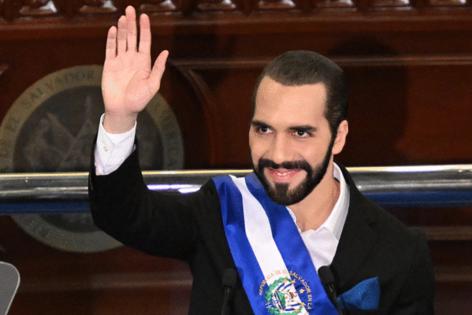Commentary: Debunking the myth of an immigrant 'invasion'
Published in Op Eds
If you care about fair elections, you need to understand what’s happening in Central America. Developments in El Salvador — along with the root causes of migration — are crucial to U.S. politics as immigration issues take center stage this election season. More than three decades after the Salvadoran civil war, it’s time to look at conditions on the ground.
Under El Salvador’s President Nayib Bukele, the country has moved away from a multi-party political system into one that concentrates power in the executive office. Bukele has used tactics such as occupying Congress and controlling social media to force his autocratic policies through. Nevertheless, Bukele’s approval ratings are impressive.
Bukele’s overwhelming popularity compels us to question features we typically assume are fundamental to democracy. For at least some voters, it’s not off the table to dispense with traditional checks and balances, the separation of powers, due process protections and civil rights. This laissez-faire attitude toward democracy raises the question: Can democracy die democratically?
In the digital age, real challenges exist to maintaining public trust and confidence in democracy, including polarization, tension around the integrity of political systems and waning faith in elections. This disappointment and exhaustion with politics help explain Bukele’s ascent to power. In the United States, we’re not immune: 57% of Republicans believe President Joe Biden wasn’t legitimately elected.
Economic hardships also affect political trends. American aid and international technical advice have failed to lift Salvadorans out of poverty and inequality. The country’s economy rests on a precarious scaffolding: Residents are extremely dependent on remittances from abroad.
Remittances account for 23.7% of the Salvadoran GPD, one of the highest rates in the world. The influx of remittances buoys the economy, meaning one of the most effective ways to lift your family out of poverty is to migrate and send money back home.
To be sure, migration is not triggered by money alone: No one risks their life for a new pair of shoes. The harsh reality is that Salvadorans across generations have experienced alarming levels of violence. In 2015, decades after the civil war ended in 1992, El Salvador became the homicide capital of the world with “one murder every hour.”
The proliferation of gangs and criminal elements, including drug trafficking and smuggling rings, partly explains the violence. Some attribute the violence to the civil war and its aftermath.
Salvadoran political, economic and security concerns all play a role in the ongoing migrant crisis, but U.S. influence is one of the most underappreciated elements.
During the Salvadoran civil war, the U.S. invested nearly $1 million per day in aid. By some estimates, from 1979 to 1992, aid totaled $7 billion. We exacerbated the conflict with these investments, and the ensuing displacement helps explain migration today.
Even in the post-war era, U.S. officials have threatened Salvadorans again and again with restrictions on lifelines like remittances and Temporary Protected Status, an immigration program. Most recently, the Trump administration attempted to deport TPS beneficiaries, triggering legal battles with organizations like Lawyers for Civil Rights in Boston. As the presidential election approaches, lives are again at stake.
In the coming months, as we’re bombarded with rhetoric about an “invasion” at the U.S. border, we must move beyond the one-dimensional lens. Politicians are increasingly fear-mongering to alarm and mobilize voters. Resisting and debunking anti-immigrant narratives will be critical to block efforts to turn November into a single-issue election pivoting on immigration.
All Salvadorans deserve an opportunity to thrive, just like everyone else. We can start by better understanding the forces shaping American-Salvadoran relations. This election year — as we navigate the unfolding migrant crisis — let’s keep our intertwined fates in mind.
____
Ivan Espinoza-Madrigal is the Executive Director of Lawyers for Civil Rights. He has filed and won dozens of life-changing and law-changing cases across the country on a wide range of civil rights issues, including immigrants’ rights. This column was produced for Progressive Perspectives, a project of The Progressive magazine, and distributed by Tribune News Service.
___
©2024 Tribune Content Agency, LLC.







Comments